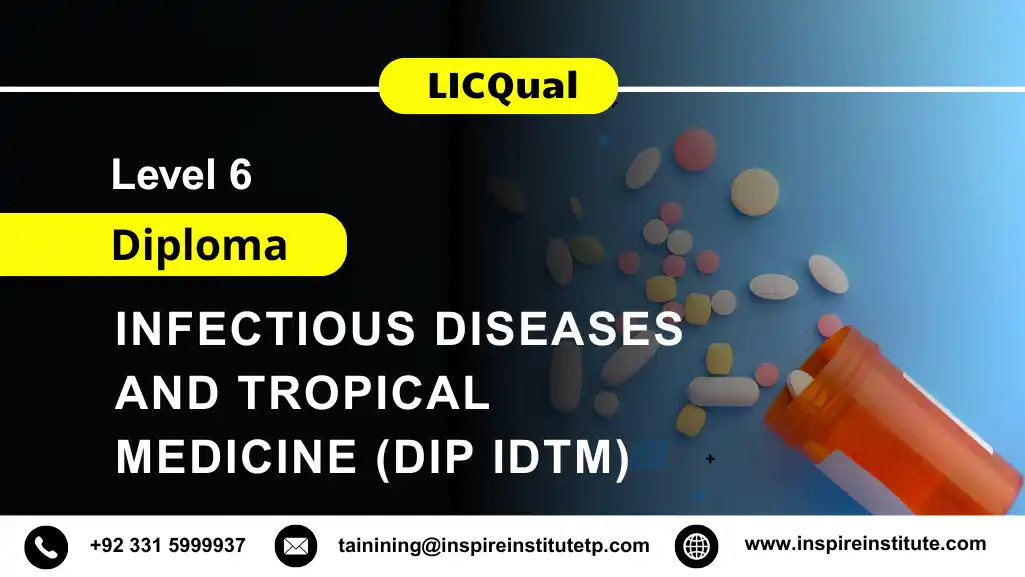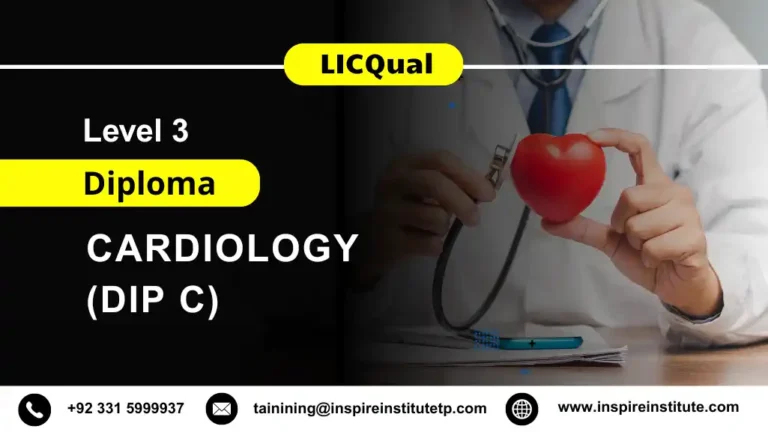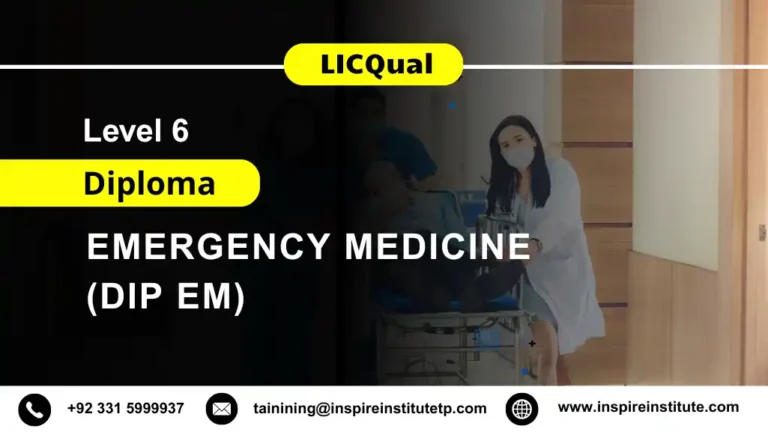LICQual Level 6 Diploma in Infectious Diseases and Tropical Medicine (Dip IDTM)
The LICQual Level 6 Diploma in Infectious Diseases and Tropical Medicine (Dip IDTM) is a UK-accredited qualification designed to equip healthcare professionals, clinicians, and researchers with advanced expertise in the prevention, diagnosis, and management of infectious and tropical diseases. In an era where global health challenges are intensifying, this diploma serves as a vital academic and professional pathway for individuals seeking to strengthen their competence in infectious disease control, epidemiology, and tropical medicine practice.
The Diploma in Infectious Diseases and Tropical Medicine integrates real-world applications through case studies, research-based assessments, and practical analytical exercises. It focuses on developing essential skills in outbreak investigation, disease surveillance, laboratory diagnostics, and infection control strategies. Graduates emerge with the confidence to assess and respond to public health emergencies, contributing meaningfully to healthcare advancement and disease prevention.
This infectious disease diploma is designed for doctors, nurses, epidemiologists, and public health professionals aiming to enhance their clinical judgment and decision-making in complex healthcare environments. It also caters to professionals working in tropical medicine, humanitarian aid, or infectious disease research, empowering them to apply scientific knowledge in diverse, resource-limited settings.
The LICQual Level 6 Diploma in Tropical Medicine and Infectious Diseases emphasises a flexible, assignment-based learning structure that accommodates working professionals. Learners can balance their professional duties while advancing academically through self-paced study modules, guided research, and expert mentorship. This approach promotes both theoretical mastery and practical competence in addressing contemporary health challenges.
Why Choose this Qualification
The LICQual Level 6 Diploma in Infectious Diseases and Tropical Medicine (Dip IDTM) is an advanced UK-accredited qualification designed to prepare healthcare professionals, medical practitioners, and public health experts to tackle infectious and tropical diseases effectively. This course provides a comprehensive understanding of epidemiology, disease prevention, control strategies, and clinical management of infectious conditions. By integrating scientific research with applied practice, learners develop the expertise needed to make informed clinical and public health decisions in both national and international contexts.
Key Reasons to Choose this Qualification
Advanced Specialist Knowledge
- Gain in-depth expertise in infectious diseases, tropical medicine, microbiology, and immunology.
- Understand the mechanisms of disease transmission, emerging pathogens, and antimicrobial resistance.
- Develop the ability to apply diagnostic techniques, interpret clinical data, and manage infectious disease outbreaks.
- Learn from evidence-based research and real-world case studies that strengthen both clinical and analytical capabilities.
Practical and Research-Based Learning
- Engage in applied research, simulations, and case analyses relevant to real-world healthcare challenges.
- Develop critical skills in outbreak investigation, laboratory analysis, and field epidemiology.
- Strengthen problem-solving abilities through project-based assessments and scenario-based learning.
- Apply research findings to improve health systems and patient care outcomes.
Internationally Recognised Qualification
- Achieve a prestigious UK-accredited Diploma in Infectious Diseases and Tropical Medicine recognised globally.
- Enhance professional credibility and meet international standards for clinical and public health competence.
- Access career opportunities across hospitals, international NGOs, and research institutions.
- Gain recognition as a skilled specialist in global infectious disease management and tropical medicine.
Flexible Learning Pathway
- Study through an assignment-based structure designed for working professionals.
- Balance learning with professional duties using online resources and academic mentorship.
- Progress at your own pace with structured guidance and digital access to expert materials.
- Build practical expertise while maintaining flexibility in your career development.
Evidence-Based Medical Practice
- Apply the latest scientific research and global health policies to clinical and field practices.
- Learn to evaluate, interpret, and implement current international guidelines and disease control strategies.
- Strengthen competence in data interpretation, infection control, and preventive medicine.
- Develop decision-making and leadership skills grounded in scientific evidence and medical ethics.
Career Advancement Opportunities
- Open pathways to specialised roles such as Infectious Disease Consultant, Epidemiologist, or Research Specialist.
- Enhance employability in hospitals, laboratories, humanitarian agencies, and global health organisations.
- Build leadership skills applicable in clinical, academic, and research settings.
- Lay the foundation for postgraduate study or advanced medical qualifications in infectious diseases and public health.
Global Relevance and Impact
- Contribute to global health improvement by addressing tropical and infectious disease challenges.
- Develop culturally competent approaches to managing diseases in resource-limited environments.
- Collaborate on global initiatives to strengthen healthcare resilience and pandemic preparedness.
- Become a key player in advancing global public health and sustainable healthcare practices.
Personal and Professional Growth
- Strengthen analytical, diagnostic, and communication skills essential for clinical excellence.
- Enhance confidence in managing complex infectious disease scenarios with ethical integrity.
- Gain leadership and interdisciplinary collaboration experience through guided mentorship.
- Prepare to make impactful contributions in both medical and humanitarian contexts.
The LICQual Level 6 Diploma in Infectious Diseases and Tropical Medicine (Dip IDTM) is an ideal qualification for professionals aiming to make a global difference in healthcare. It combines scientific knowledge, practical expertise, and international standards to produce highly competent specialists ready to confront modern infectious disease challenges with skill and confidence.tence, and healthcare excellence globally.
Course Overview
LICQual UK Awarding Body
Average Completion Time:
6-24 Months
Study Units: 6 Units
Evidence & Assignment Based
Mandatory Units
Who Should Take This Course
The LICQual Level 6 Diploma in Infectious Diseases and Tropical Medicine (Dip IDTM) is a globally recognised UK-accredited qualification designed for healthcare professionals and medical practitioners seeking advanced expertise in the prevention, diagnosis, and management of infectious and tropical diseases. This comprehensive programme integrates theoretical knowledge with practical applications, preparing learners to work effectively in hospitals, laboratories, research institutions, and global health organisations. The course caters to individuals who wish to enhance their understanding of infectious diseases, contribute to global health initiatives, and develop leadership in disease control and outbreak management.
This course is suitable for
Medical and Healthcare Professionals
- Ideal for doctors, nurses, and medical specialists involved in infectious disease treatment and prevention.
- Equips clinicians with diagnostic, therapeutic, and epidemiological expertise for managing complex cases.
- Strengthens practical skills in infection control, antimicrobial management, and clinical decision-making.
- Enhances capability to work in multidisciplinary healthcare environments and improve patient outcomes.
Public Health Officers and Epidemiologists
- Designed for professionals engaged in public health monitoring, disease surveillance, and policy implementation.
- Provides analytical tools for identifying, investigating, and controlling outbreaks effectively.
- Improves understanding of epidemiological models and health data interpretation.
- Prepares learners to contribute to national and international public health initiatives.
Laboratory Technologists and Microbiologists
- Suitable for individuals specialising in microbiology, virology, or biomedical science.
- Builds skills in laboratory diagnostics, molecular techniques, and pathogen identification.
- Encourages adherence to biosafety standards and best practices in infectious disease laboratories.
- Enhances ability to support clinical teams with precise and evidence-based diagnostic information.
NGO and Humanitarian Health Workers
- Ideal for professionals working with international aid organisations or humanitarian missions.
- Prepares learners to handle infectious disease challenges in resource-limited or crisis-affected regions.
- Strengthens knowledge in preventive healthcare, vaccination programmes, and field epidemiology.
- Encourages culturally sensitive approaches to community health promotion and disease prevention.
Researchers and Academics
- Designed for individuals pursuing research in infectious diseases, tropical medicine, or epidemiology.
- Develops competence in scientific writing, data interpretation, and evidence-based publication.
- Provides the foundation for contributing to innovative research and global health knowledge.
- Encourages participation in collaborative projects and medical research networks.
Policy Makers and Health Administrators
- Beneficial for professionals involved in healthcare planning, public health policy, or disease control strategy.
- Builds analytical and strategic planning skills for effective programme design and evaluation.
- Enables learners to align national health initiatives with international infectious disease standards.
- Equips participants to lead policy discussions and advocate for sustainable health interventions.
Paramedical and Allied Health Professionals
- Suitable for healthcare assistants, clinical officers, and allied health workers engaged in patient support roles.
- Provides essential understanding of infection prevention, control measures, and basic diagnostics.
- Encourages inter-professional collaboration and continuous learning in clinical environments.
- Enhances readiness to contribute effectively in healthcare teams focused on infectious disease management.
Graduates Seeking Career Advancement
- Ideal for recent graduates in medicine, nursing, or life sciences seeking to specialise in infectious diseases.
- Offers a strong foundation for postgraduate studies or advanced clinical training.
- Builds academic, analytical, and professional confidence in infectious and tropical medicine.
- Expands global employment opportunities across healthcare and research institutions.
The LICQual Level 6 Diploma in Infectious Diseases and Tropical Medicine (Dip IDTM) is suited for a wide range of healthcare and public health professionals dedicated to improving global health outcomes. By fostering advanced knowledge, practical experience, and international competence, this qualification empowers learners to address infectious disease challenges with confidence and contribute meaningfully to global healthcare resilience.
Course Benefits
The LICQual Level 6 Diploma in Infectious Diseases and Tropical Medicine (Dip IDTM) is a UK-accredited qualification developed for healthcare professionals, epidemiologists, researchers, and public health practitioners who aim to deepen their expertise in identifying, managing, and preventing infectious and tropical diseases. This advanced, assignment-based diploma integrates theoretical knowledge with real-world medical practice, enabling learners to develop, implement, and evaluate strategies for effective disease control, outbreak response, and global health improvement. Through research-driven learning and flexible study options, this qualification equips professionals to deliver high-quality healthcare, enhance public health preparedness, and contribute to advancements in tropical and infectious disease medicine.
Key Benefits of the Course
- Specialist Knowledge:
Gain a comprehensive understanding of infectious disease pathology, tropical medicine, and immunology. Learners explore key topics such as viral, bacterial, parasitic, and vector-borne diseases, antimicrobial resistance, and vaccination strategies. The programme enhances learners’ ability to assess global disease trends, apply diagnostic tools, and implement evidence-based infection control practices in various healthcare settings. - Practical Application:
Develop hands-on expertise through clinical case studies, outbreak simulations, and applied research assignments. Learners strengthen their capacity to diagnose, treat, and manage infectious and tropical diseases effectively. The course also focuses on integrating surveillance data, coordinating emergency response teams, and implementing public health interventions that mitigate disease transmission. - Recognised Qualification:
Earn a globally respected UK-accredited Diploma in Infectious Diseases and Tropical Medicine (Dip IDTM) that validates clinical competence and public health leadership. This internationally recognised qualification enhances professional credibility, allowing graduates to meet international health standards and pursue advanced roles in hospitals, research institutions, NGOs, and global health agencies. - Flexible Learning Pathway:
Designed for working healthcare and public health professionals, this assignment-based qualification allows flexible study while maintaining career commitments. Learners access digital resources, guided mentorship, and structured learning support, ensuring a balanced and progressive approach to achieving academic and professional excellence. - Evidence-Based Training:
Engage with current global research, WHO guidelines, and epidemiological practices. The course focuses on integrating evidence-based approaches in diagnostics, treatment protocols, and disease surveillance. Learners gain analytical and research skills necessary for interpreting scientific data and applying validated practices to improve health outcomes and combat disease outbreaks. - Career Development:
This diploma opens diverse career opportunities in hospitals, research centres, health ministries, NGOs, and international health organisations. Graduates can pursue roles such as Infectious Disease Specialist, Epidemiologist, Global Health Advisor, or Clinical Research Coordinator. It also provides an academic foundation for postgraduate or specialised studies in infectious disease or tropical medicine. - Enhanced Public Health Impact:
Learn to deliver patient-centred, ethical, and community-focused care for populations affected by infectious diseases. The programme fosters the ability to address emerging health challenges, implement prevention strategies, and promote sustainable disease control measures that improve global health equity and resilience. - Professional Growth:
Strengthen analytical thinking, clinical judgment, leadership, and cross-cultural communication skills essential for global health practice. The diploma promotes reflective learning, interdisciplinary collaboration, and decision-making in critical healthcare scenarios, preparing professionals to lead and innovate in the field of infectious and tropical medicine.
The LICQual Level 6 Diploma in Infectious Diseases and Tropical Medicine (Dip IDTM) empowers healthcare professionals to become global health leaders through advanced clinical insight, public health expertise, and internationally recognised qualifications. It builds a pathway for impactful careers while contributing to the prevention and control of infectious diseases worldwide.
Eligibility Criteria
The LICQual Level 6 Diploma in Infectious Diseases and Tropical Medicine (Dip IDTM) is a prestigious UK-accredited qualification designed for healthcare professionals, clinicians, epidemiologists, and medical researchers seeking to expand their expertise in diagnosing, managing, and preventing infectious and tropical diseases.
Educational Background:
Applicants should possess a recognised qualification in medicine, nursing, healthcare, biomedical sciences, or a related clinical or public health field. A Level 5 diploma or equivalent qualification in healthcare, infectious diseases, or biological sciences may also be accepted. Candidates holding international degrees in medical or allied health disciplines will be assessed individually to determine eligibility and equivalence to UK academic standards.
Professional Experience:
A minimum of one year of experience in healthcare, clinical practice, laboratory diagnostics, or public health is recommended. Previous exposure to patient care, disease surveillance, or research activities in infectious or tropical medicine provides an advantage. However, motivated learners with a strong interest in disease management, epidemiology, or global health, even without direct field experience, are also encouraged to apply.
Age Requirement:
Applicants must be at least 18 years of age at the time of enrolment. This ensures that learners possess the maturity, ethical awareness, and professional responsibility necessary for advanced academic study and practical application in healthcare and public health environments.
Language Proficiency:
As the programme is delivered entirely in English, applicants must demonstrate proficiency in reading, writing, and verbal communication. For non-native English speakers, a minimum IELTS score of 6.0 or an equivalent qualification is recommended to ensure active participation in assignments, research projects, and professional discussions.
Technical Requirements:
Learners should have access to a computer or laptop with a stable internet connection to engage in online learning, access study materials, and submit assessments. Basic computer literacy, including skills in research, data analysis, report writing, and presentation software, is essential for academic and professional success in this qualification.
Required Documents:
Applicants are required to provide the following documents during registration:
A valid ID card or passport for identity verification.
Academic transcripts or certificates of previous qualifications.
Proof of professional experience in healthcare, public health, or infectious disease practice (if applicable).
The LICQual Level 6 Diploma in Infectious Diseases and Tropical Medicine (Dip IDTM) is an ideal pathway for healthcare professionals committed to advancing their clinical expertise, enhancing their global health impact, and contributing to the prevention and control of infectious diseases through research-driven, evidence-based medical practice.
The Qualification Process
LICQual Level 6 Diploma in Infectious Diseases and Tropical Medicine (Dip IDTM) follows a structured pathway to ensure learners gain comprehensive knowledge, practical skills, and professional competence in community oral healthcare.
Step 1: Self-Assessment
Learners review the entry requirements to confirm eligibility. Candidates with a background in dentistry, oral health, or public health are encouraged to apply.
Step 2: Registration
Complete the registration process by submitting required documents such as proof of qualifications, a valid ID, and payment of enrollment fees.
Step 3: Induction
An induction session is conducted to:
- Verify learner eligibility and documentation.
- Introduce study materials, learning outcomes, and assessment procedures.
Step 4: Learning and Evidence Submission
Learners complete assignments, case studies, and practical exercises demonstrating competence in public health dentistry, community oral health assessment, preventive strategies, and program planning.
Step 5: Feedback and Revision
Assessors review submitted evidence and provide constructive feedback. Learners can revise and resubmit work to meet all required standards.
Step 6: Competence Validation
Final submissions are evaluated to confirm that learners have met all theoretical and practical learning outcomes.
Step 7: Internal Quality Assurance (IQA)
The IQA team reviews the assessment process to ensure accuracy, fairness, and compliance with international standards.
Step 8: External Verification (EQA)
External verifiers validate the authenticity and quality of learner achievements.
Step 9: Certification
Upon successful verification, learners are awarded LICQual Level 6 Diploma in Infectious Diseases and Tropical Medicine (Dip IDTM) , demonstrating advanced proficiency in community oral healthcare and preparing them for professional growth in dental public health, preventive dentistry, and healthcare policy.







